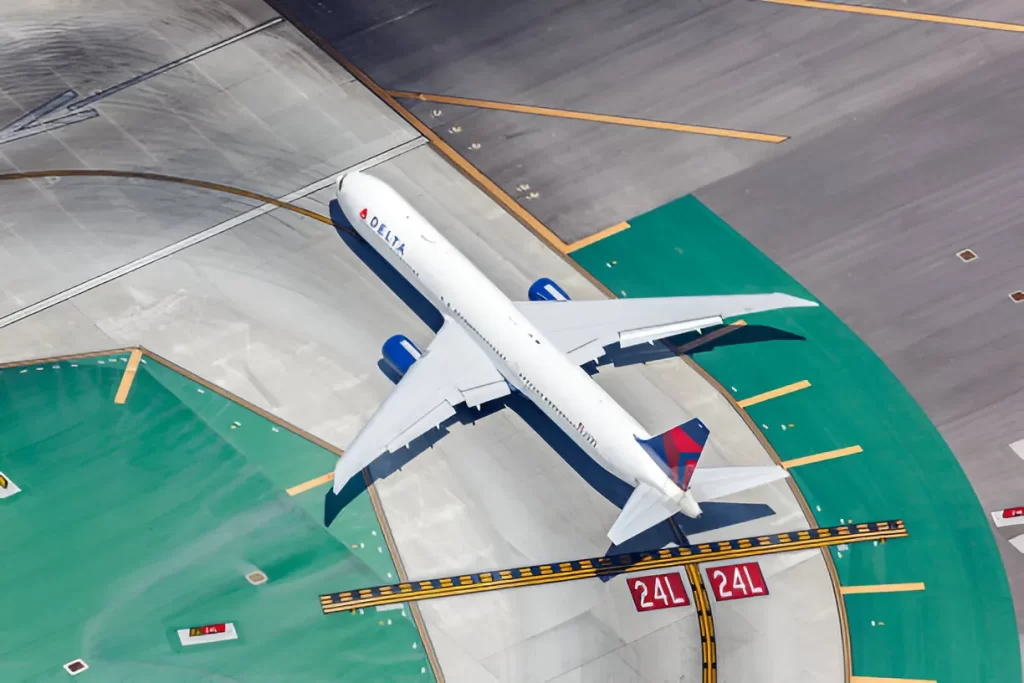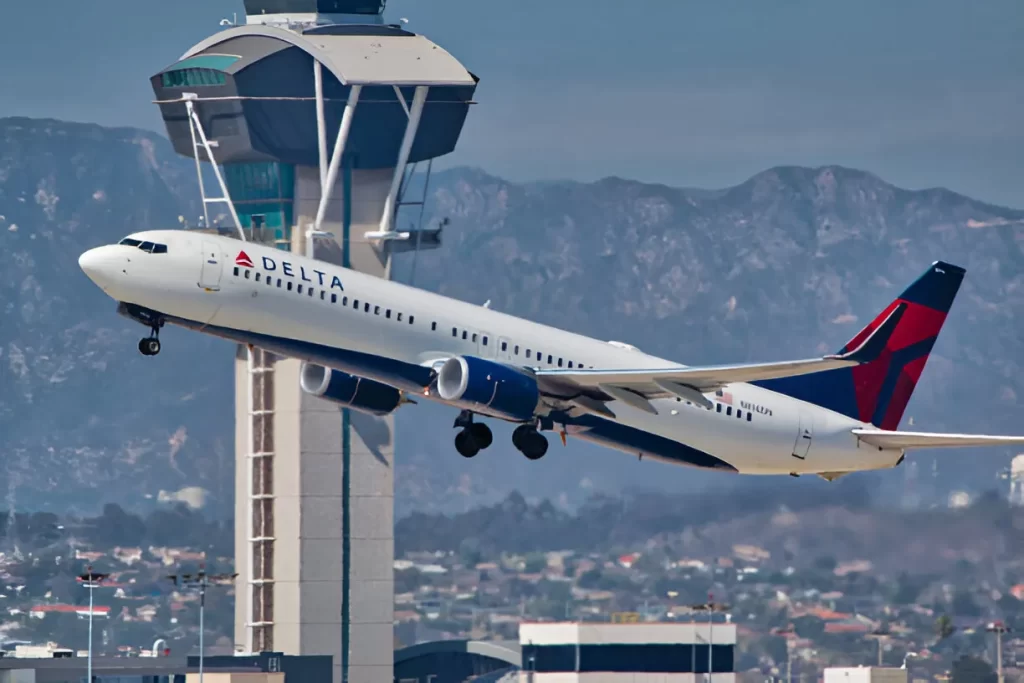Table of Contents
On May 28, 2025, Delta Air Lines Flight DL275, scheduled to fly from Detroit Metropolitan Airport (DTW) to Tokyo Haneda Airport (HND), made headlines after being unexpectedly diverted to Los Angeles International Airport (LAX).
While emergency landings are rare, they often raise serious safety concerns, and this case was no different.
So, why was Delta Flight DL275 diverted to LAX? Here’s everything you need to know, from what caused the diversion to expert insights and lessons for airline passengers.
Quick Summary
- Flight: Delta Air Lines DL275
- Route: Detroit (DTW) → Tokyo Haneda (HND)
- Aircraft: Airbus A350-900 (tail number N508DN)
- Diversion: Los Angeles (LAX)
- Reason: Suspected anti-ice system malfunction in one engine
- Outcome: Safe landing, no injuries, aircraft grounded for maintenance
What Caused the Diversion?
According to initial reports and flight data tracking, Delta DL275 encountered an issue with the engine’s anti-ice system approximately five hours into the flight. While cruising at 38,000 feet over the Pacific Ocean, pilots received a fault indication.
Why the Anti-Ice System Matters
Jet engines flying at high altitudes are vulnerable to ice formation, especially in moist, cold air. An anti-ice system helps prevent ice buildup on engine intakes, which could lead to:
- Reduced airflow
- Flameouts
- Catastrophic engine damage
When the system fails or malfunctions, the safe course of action is to divert, especially on long-haul, over-water flights.
“The anti-ice system is a non-negotiable safety component. If there’s any doubt about its reliability, we land immediately,” says aviation safety expert David Southers from AeroSecure International.
Why did Delta Flight DL275 LAX Divert to Los Angeles?

Delta had several options for emergency diversion: Anchorage (ANC), San Francisco (SFO), Seattle (SEA), or even turning back. But LAX was the most logical choice, and here’s why:
- Delta Maintenance Base at LAX
Delta has a fully equipped international maintenance facility at LAX capable of servicing widebody aircraft like the A350. - Better Weather & Visibility
Compared to Alaska or the Pacific Northwest, Southern California offered better conditions for a safe descent and landing. - Passenger Support
As a major Delta hub, LAX could quickly rebook passengers, provide hotel accommodations, and process customs clearances. - Long Runways for Heavy Aircraft
LAX has multiple runways over 12,000 feet long—ideal for handling emergency landings of fuel-heavy international flights.
Timeline of Events
| Time (PDT) | Event |
|---|---|
| 3:53 PM (ET) | Flight DL275 departs Detroit |
| ~8:45 PM | Engine anti-ice system warning triggered |
| 9:00 PM | Flight crew initiates emergency diversion |
| 1:08 AM (PT) | DL275 lands safely at LAX |
| Morning | Passengers rebooked, maintenance initiated |
| Next Day | Aircraft returned to service after full inspection |
How Pilots Handle In-Flight System Failures?
Commercial airline pilots are trained to handle complex in-flight system alerts like anti-ice failure using a structured process:
- Checklists: Triggering Emergency/Abnormal Checklist
- Communicate: Notify ATC, dispatch, and cabin crew
- Divert: Choose the closest safe airport with support infrastructure
- Monitor: Adjust altitude or route to reduce icing exposure
“It’s not just about engine failure—it’s about proactively avoiding a failure. That’s what great crews do,” explains former Delta captain Rick Adkins.
Operational Impact on Delta
While the aircraft landed safely and there were no injuries, the cost of an international diversion is significant.
Estimated Costs:
- Fuel Dump or Burn: $20,000–$40,000
- Ground Handling: $50,000+ at LAX
- Passenger Re-accommodation: $100,000–$200,000 (hotels, meals, rebookings)
- Maintenance & Delay: ~$1 million (est.)
- Total: Estimated between $1.2–$2.5 million
Passenger Experience: What Happened Onboard?
Reports suggest passengers were calm and cooperative. The cabin crew informed everyone of the diversion, and Delta provided:
- Overnight hotel stays for rebooked travelers
- Food vouchers and ground transport
- Flight rebookings via Delta and partner airlines
Delta’s official statement emphasized their “commitment to passenger safety above all.”
What Aviation Experts Are Saying?
Here’s what professionals in the aviation world are saying:
“This was a textbook diversion. The pilots made the right call. In aviation, small system faults can lead to big problems if ignored,” – John Cox, former airline pilot & safety consultant
“Choosing LAX made sense. It’s a major hub for widebody aircraft, and Delta has the tools on the ground to fix an A350 fast,” – AviationPros.com
Read also: Why Should I Visit Jaroconca
What You Can Learn as a Passenger?
If you ever experience a diverted flight, keep these tips in mind:
- Stay Calm – Diversions are for safety, not drama.
- Listen to the Crew – Follow instructions and announcements.
- Expect Delays – Rebookings take time, but safety comes first.
- Document Your Expenses – You may be eligible for reimbursement.
- Use Airline Apps – Rebook or track status digitally if possible.
Final Words
Delta’s quick decision to divert Flight DL275 to LAX shows the importance of preventative action in modern aviation. Even though the aircraft wasn’t in immediate danger, potential engine icing could’ve escalated mid-Pacific.
With an experienced flight crew, a well-maintained aircraft, and solid ground support, the incident was handled professionally, efficiently, and safely.
As passengers, we may not always see the technical reasons behind flight changes, but we can trust that behind every diversion is a careful, calculated decision to protect lives.
People also ask
Why would a flight be diverted to a different airport?
A flight is diverted due to weather, mechanical issues, medical emergencies, or airport closures to ensure passenger safety.
Why did Delta change to zones on flights?
Delta uses boarding zones to speed up the process, reduce crowding at gates, and prioritize passengers based on status or seat type.
What happens if a flight is diverted while you’re in the air?
The plane lands at the nearest safe airport, and the airline arranges rebooking, meals, or hotel stays depending on the delay.
Can I get compensation if my flight is diverted?
In most U.S. cases, airlines aren’t required to compensate for diversions, but they may offer vouchers, rebooking, or refunds as goodwill.






